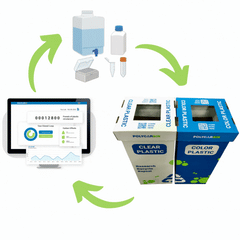Sustainable Science: Not Just Good For the Planet, Good for the Bottom Line
An interview with Scott Renninger, EH&S Environmental Manager at Zymergen, a Polycarbin partner.

As a 12 year veteran of Burt’s Bees, a company well known for its sustainability efforts, Scott Renninger knows a thing or two about environmental impact of business practices. Which is why he was the perfect person to take on a project at Zymergen to live up to its name as a public benefit corporation (PBC) by addressing the inherent waste of lab plastics in scientific research.
Zymergen, a PBC “whose mission is to displace the petrochemicals that pollute the Planet by designing, developing, and commercializing bio-based materials”, like many biotechnology, pharmaceutical, and life science organizations, do scientific research in the development of their products. This means a whole lot of single-use plastics, like pipette tips and tubes, are used and disposed of along the product development pipeline. The disposal of that plastic costs money. And in what Scott describes as a “rampant issue across biotech”, the overclassification of used lab products as hazardous medical waste only exacerbate the issue. “We were paying a lot for that hazardous medical waste to go out and we were also just throwing good plastic away,” says Scott about recognizing the opportunity for improvement.
After a preliminary conversation with Polycarbin, Scott and his team determined that only 20% of the lab plastics they were classifying as hazardous medical waste actually fit into that category. This realization led them to pilot a program where the other 80% of their used rigid lab plastics would be sent to Polycarbin and enter the circular economy. And the pilot turned out to be a resounding success. “This is working. We are saving money. We are reducing costs. We are recycling and doing everything we can to be more sustainable,” Scott remembers about the results of the pilot. And so the plan is to implement the Polycarbin service across the rest of the organization going forward.

When asked about the process for bringing the Polycarbin diversion bins (called Carbins) into the organization, Scott praised the speed and adaptability of the Polycarbin support team. “Noah and James provided the initial training and they gave us a lot of information on the materials they accept and don’t”, which helped enable the tailoring of the internal training for scientists who would be using the Carbins.
Asked to sum up his experience with Polycarbin and the impact it has on the Zymergen mission and bottom line Scott says, “we took all the metrics from month to month to month and showed our medical waste costs going down and our recycling going up…and I don’t know anybody who would say Polycarbin isn’t a great idea.”

–
Ready to save money on your overclassified medical hazardous waste? Get in touch with us for a free consultation.












